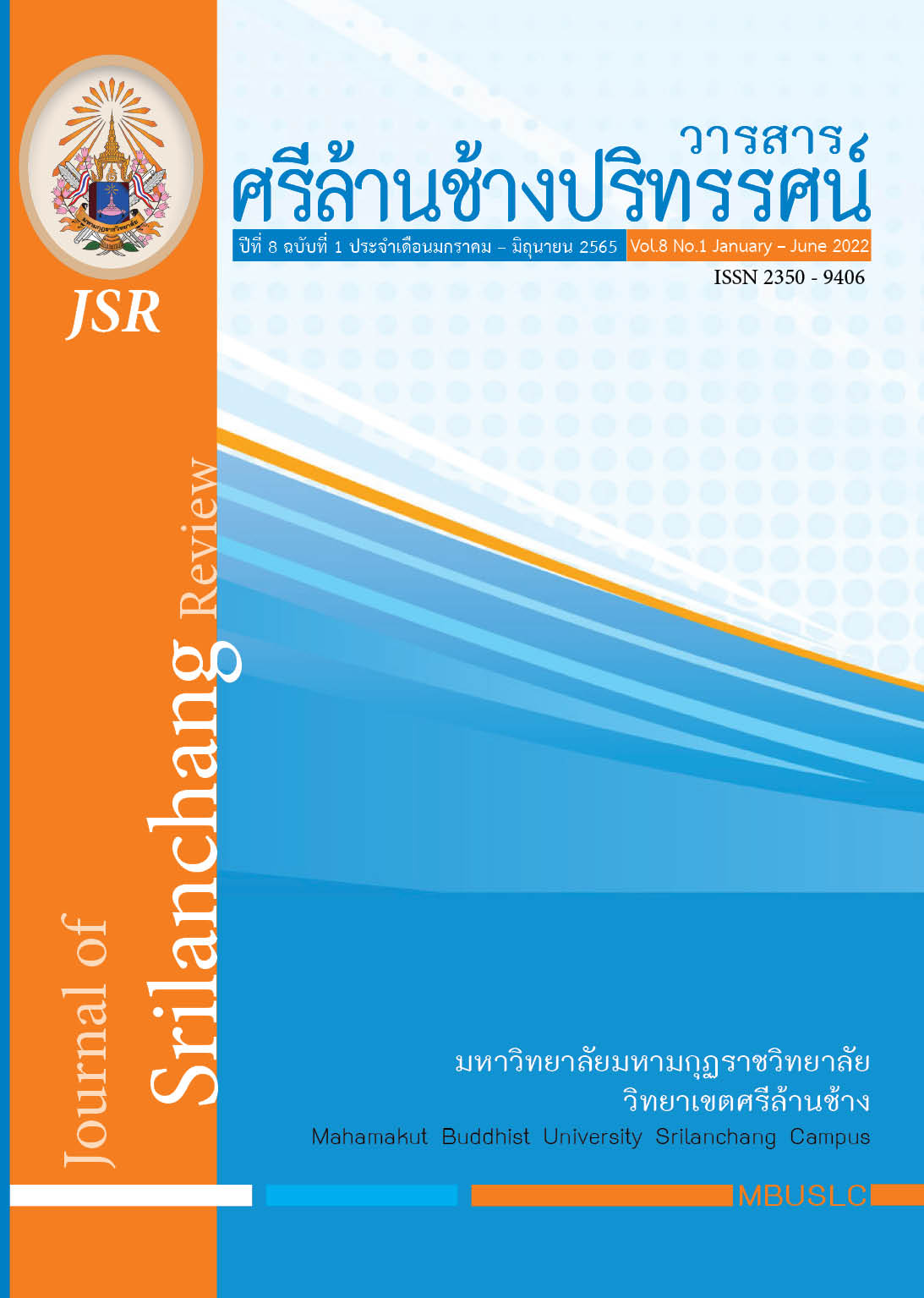A STUDY OF SOCIAL ENTREPRENEUR’S CHARACTERISTICS OF SECONDARY SCHOOL STUDENTS IN SAMUT PRAKAN PROVINCE
Main Article Content
Abstract
This research aims 1) to study level of social entrepreneur’s characteristics of secondary school students in Samut Prakan province and 2) to compare level of social entrepreneur’s characteristics of secondary school students in Samut Prakan according to gender and education levels. The informants were 383 students from 25 secondary schools in Samut Prakan province in academic year of 2021. Data were collected by questionnaire. The collections were analyzed by descriptive statistics which were frequency, percentage, means, and standard deviations and inferential statistics which were independent Two-way ANOVA and Scheffe’s Method.
The results were found that:
- Level of social entrepreneur’s characteristics of secondary school students in Samut Prakan both in overall and individual aspect were at high level.
- Social entrepreneur’s characteristics of secondary school students in Samut Prakan between different gender were not different. The social entrepreneur’s characteristics of secondary school students in Samut Prakan among different education levels were different statistically significant at .05level. The variance of social entrepreneurs’ characteristics of the students by using two independent variables which were gender and education levels did not interact.
Article Details

This work is licensed under a Creative Commons Attribution-NonCommercial-NoDerivatives 4.0 International License.
บทความที่ได้รับการพิจารณาจากคณะกรรมการผู้ทรงคุณวุฒิและเผยแผ่ในวารสารฉบับนี้ เป็นทัศนคติและข้อคิดเห็นส่วนบุคคลของผู้เขียนแต่ละท่าน ไม่ถือว่าเป็นทัศนะคติและความรับผิดชอบ
ของบรรณาธิการ
บทความ ข้อมูล เนื้อหา รูปภาพ ฯลฯ ที่ได้รับการตีพิมพ์ในวารสารศรีล้านช้างปริทรรศน์ ถือเป็นลิขสิทธิ์ของวารสารศรีล้านช้างปริทรรศน์ หากบุคคลหรือหน่วยงานใดต้องการนำทั้งหมดหรือส่วนหนึ่งส่วนใดไปเผยแพร่ต่อหรือเพื่อกระทำการใด ๆ จะต้องได้รับอนุญาตเป็นลายลักอักษรจากวารสารศรีล้านช้างปริทรรศน์ ก่อนเท่านั้น
References
กระทรวงศึกษาธิการ.(2551). แนวทางการบริหารจัดทำหลักสูตรตามหลักสูตรแกนกลางการศึกษาขั้นพื้นฐาน พุทธศักราช 2551.กรุงเทพฯ:โรงพิมพ์ชุมนุมสหกรณ์การเกษตรแห่งประเทศไทย.
กระทรวงศึกษาธิการ. (2561). รายการวิจัย การจัดการศึกษาเพื่อพัฒนาความเป็นผู้ประกอบการ(Entrepreneurship Education). พริกหวานกราฟฟิค.
เกรียงศักดิ์ เจริญวงศ์ศักดิ์. (2550). การประกอบการเพื่อสังคม : กระบวนทัศน์ใหม่เพื่อรังสรรค์สังคม. สยามรัฐรายวัน 15, 84 (28 สิงหาคม 2550).
ชนิกานต์ ปัททุม. (2561). พฤติกรรมการมีจิตสาธารณะของนักศึกษามหาวิทยาลัยศิลปากร พระราชวังสนามจันทร์. วิทยานิพนธ์ ภาควิชาจิตวิทยาและการแนะแนว มหาวิทยาลัยศิลปากร.
ทิศนา แขมมณี. (2562). ศาสตร์การสอนองค์ความรู้เพื่อการจัดกระบวนการเรียนรู้ที่มีประสิทธิภาพ. พิมพ์ครั้งที่ 23. กรุงเทพฯ: จุฬาลงกรณ์มหาวิทยาลัย.
บุญชม ศรีสะอาด และคณะ. (2546). การวิจัยสำหรับครู. กรุงเทพมหานคร : สุวีริยาสาส์น.
พักตร์ผจง วัฒนสินธุ์ และพสุ เดชะรินทร์. (2552). การจัดการเชิงกลยุทธ์และนโยบายธุรกิจ. พิมพ์ครั้งที่ 5. กรุงเทพมหานดร : โรงพิมพ์แห่งจุฬาลงกรณ์มหาวิทยาลัย.
ศักดิพล เจือศรีกุล. (2560). ผู้ประกอบการไทยกับเศรษฐกิจไทยปี 2560. ออนไลน์. สืบค้นเมื่อวันที่ 1 เมษายน 2565, จาก https://m.posttoday.com/social/think/477397
สุคนธ์ธา เส็งเจริญ. (2556). การเปรียบเทียบคุณลักษณะด้านจิตสาธารณะของนักศึกษามหาวิทยาลัยศรีนครินทรวิโรฒ. ปริญญานิพนธ์การศึกษามหาบัณฑิต สาขาการวิจัยและสถิติการศึกษา มหาวิทยาลัยศรีนครินทรวิโรฒ, กรุงเทพมหานคร.
สำนักงานเขตพื้นที่การศึกษามัธยมศึกษา เขต 6. (2563). แผนปฏิบัติการประจำปีงบประมาณ 2563 : สำนักงานเขตพื้นที่.
สำนักงานเลขาธิการสภากาศึกษา. (2560). มาตรฐานการศึกษาชาติ พ.ศ.2561. กรุงเทพมหานคร: 21 เซนจูรี่ จำกัด.
อำพล ชะโยมชัย. (2018). การศึกษาความสัมพันธ์เชิงพยากรณ์ ระหว่างคุณลักษณะความเป็นผู้ ประกอบการทางสังคมขององค์กรกับความยั่งยืนทางเศรษฐกิจขององค์กรธุรกิจในประเทศไทย. Panyapiwat Journal, 31(10), 13-25.
Blackburn, R., & Ram, M. (2006). Fix or fixation? The contributions and limitations of
entrepreneurship and small firms to combating social exclusion.Entrepreneurship and Regional Development, 18(1), 73-89.
Kane, G. (2012). The green executive: corporate leadership in a low carbon economy. Routledge.
Krejcie, R. V., & Morgan, D. W. (1970). Determining sample size for research activities Educational and psychological measurement, 30(3), 607-610.
Lee, K. (2018). What do we think how best to teach university students to become entrepreneurial: The lecturers’ perspective. Proceedings of the 6th International Conference on Innovation and Entrepreneurship, USA, 206-213.
Manandhar, T. & Shrestha, P. (2019). A study on Relationship Between Self-discipline and Study Habits among Nursing Students at Bhaktapur, Nepal. International Journal of Health Sciences and Research. 9(5): 242-248.
McPhee, W. (2014). A new sustainability model: Engaging the entire firm. Journal of Business Strategy, 35(2), 4-12.
Savitz, A. (2013). Talent, transformation, and the triple bottom line: How companies can leverage human resources to achieve sustainable growth. John Wiley & Sons.
Swanson, L. A. (2017). Entrepreneurship and Innovation Toolkit.
Singer, S., Amorós, J. E., & Arreola, D. M. (2015). Global Entrepreneurship Monitor 2014 Global Report. Mexico, Monterrey: Global Entrepreneurship Monitor Association.


